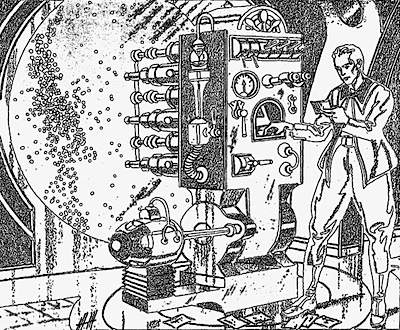Science Fiction
Dictionary
A B C D E F G H I J K L M N O P Q R S T U V W X Y Z
NASA's Exoplanet Superheroes

NASA has some pretty amazing technology for discovering exoplanets and even the moons of exoplanets (see Gas Giant Exoplanet Can Has Moons?); now they even have a pretty amazing video:
To capture finer details – detecting atmospheres on small, rocky planets like Earth, for instance, to seek potential signs of habitability – astronomers knew they needed what we might call “superhero” telescopes, capable of blasting off the surface into orbit.“While ground-based telescopes showed us that it is indeed possible to discover new planets, it’s often space-based facilities that allow us to advance from initial detections to well-understood worlds,” said Jennifer Burt, an exoplanet scientist at NASA’s Jet Propulsion Laboratory in Southern California.
Over the past few decades, a team of now-legendary space telescopes answered the call: Hubble, Chandra, Spitzer, Kepler, TESS, and now, the Webb telescope.
(Via NASA)
Golden Age science fiction master Edmond Hamilton described the idea of an automated habitable planet-finding telescope in his 1936 short story Cosmic Quest:
I was near enough it now to set my automatic astronomical instruments to searching it for a habitable planet.These instruments were the wonderful ones our astronomers had perfected. With super-telescopic eyes each one scanned a part of the star field before them. And each mechanical eye, when it found planetary systems in its field, automatically shifted upon them a higher powered telespectroscope which recorded on permanent film the size, mean temperature and atmospheric conditions of these worlds.
(Read more about Hamilton's search for habitable planets)

(The telespectroscope recorded the conditions of these other worlds)
Scroll down for more stories in the same category. (Story submitted 2/23/2022)
Follow this kind of news @Technovelgy.| Email | RSS | Blog It | Stumble | del.icio.us | Digg | Reddit |
Would
you like to contribute a story tip?
It's easy:
Get the URL of the story, and the related sf author, and add
it here.
Comment/Join discussion ( 0 )
Related News Stories - (" Space Tech ")
The New Habitable Zones Include Asimov's Ribbon Worlds
'...there's a narrow belt where the climate is moderate.' - Harl Vincent, 1931.
Will Space Stations Have Large Interior Spaces Again?
'They filed clumsily into the battleroom, like children in a swimming pool for the first time, clinging to the handholds along the side.' - Orson Scott Card, 1985.
Reflect Orbital Offers 'Sunlight on Demand' And Light Pollution
'I don't have to tell you about the seven two-mile-diameter orbital mirrors...'
Chrysalis Generation Ship to Alpha Centauri
'This was their world, their planet —
this swift-traveling, yet seemingly moveless vessel.' - Nat Schachner, 1934
Technovelgy (that's tech-novel-gee!) is devoted to the creative science inventions and ideas of sf authors. Look for the Invention Category that interests you, the Glossary, the Invention Timeline, or see what's New.
Science Fiction
Timeline
1600-1899
1900-1939
1940's 1950's
1960's 1970's
1980's 1990's
2000's 2010's
Current News
The New Habitable Zones Include Asimov's Ribbon Worlds
'...there's a narrow belt where the climate is moderate.'
Can One Robot Do Many Tasks?
'... with the Master-operator all you have to do is push one! A remarkable achievement!'
Atlas Robot Makes Uncomfortable Movements
'Not like me. A T-1000, advanced prototype. A mimetic poly-alloy. Liquid metal.'
Boring Company Drills Asimov's Single Vehicle Tunnels
'It was riddled with holes that were the mouths of tunnels.'
Humanoid Robots Tickle The Ivories
'The massive feet working the pedals, arms and hands flashing and glinting...'
A Remarkable Coincidence
'There is a philosophical problem of some difficulty here...'
Cortex 1 - Today A Warehouse, Tomorrow A Calculator Planet
'There were cubic miles of it, and it glistened like a silvery Christmas tree...'
Perching Ambush Drones
'On the chest of drawers something was perched.'
Leader-Follower Autonomous Vehicle Technology
'Jason had been guiding the caravan of cars as usual...'
Golf Ball Test Robot Wears Them Out
"The robot solemnly hit a ball against the wall, picked it up and teed it, hit it again, over and again...'
Boring Company Vegas Loop Like Asimov Said
'There was a wall ahead... It was riddled with holes that were the mouths of tunnels.'
Rigid Metallic Clothing From Science Fiction To You
'...support the interior human structure against Jupiter’s pull.'
Is The Seattle Ultrasonics C-200 A Heinlein Vibroblade?
'It ain't a vibroblade. It's steel. Messy.'
Roborock Saros Z70 Is A Robot Vacuum With An Arm
'Anything larger than a BB shot it picked up and placed in a tray...'
A Beautiful Visualization Of Compact Food
'The German chemists have discovered how to supply the needed elements in compact, undiluted form...'
Bone-Building Drug Evenity Approved
'Compounds devised by the biochemists for the rapid building of bone...'
